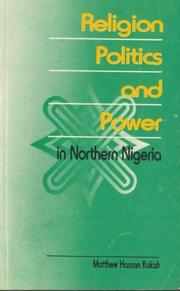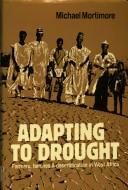| Listing 1 - 10 of 14 | << page >> |
Sort by
|
Book
ISBN: 9789650523 9789789650521 9785487024 9789785487022 Year: 2018 Publisher: Baltimore, Maryland : Baltimore, Md. : Project Muse, Project MUSE,
Abstract | Keywords | Export | Availability | Bookmark
 Loading...
Loading...Choose an application
- Reference Manager
- EndNote
- RefWorks (Direct export to RefWorks)
This book explores from various perspectives how the literature of the northern region of Nigeria has promoted the ideology of integration and societal resurgence. Through the diverse cultural productions from this very heterogenous socio-political region, researchers have dissected the portrayals and characterisations of ideologies which foster harmony among the people who speak a multitude of languages and have an array of cultural practices. These contributions bring to the fore the multiple roles that both indigenous literary productions and those adapted from foreign elements have played in realising social and cultural integration and advancing collective values of the people of Northern Nigeria. This collection of essays is the result of a selection of scholarly contributions to two national conferences on Literature on Northern Nigeria held at the Kwara State University, Malete in 2015 and 2016.
Nigerian literature --- Social aspects. --- Nigeria, Northern --- Northern Nigeria (Region) --- Social conditions.
Book
ISBN: 9781400871766 140087176X 9780691621432 0691621438 0691648093 Year: 2015 Publisher: Princeton, NJ
Abstract | Keywords | Export | Availability | Bookmark
 Loading...
Loading...Choose an application
- Reference Manager
- EndNote
- RefWorks (Direct export to RefWorks)
Taking Northern Nigeria during the years 1946 to 1966 as an example, Professor Whitaker shows how modern institutions-parliamentary representation, a cabinet system, popular suffrage, and political parties-were introduced and how they resulted not in a displacement of tradition but in an astute absorption by traditional forces.Originally published in 1970.The Princeton Legacy Library uses the latest print-on-demand technology to again make available previously out-of-print books from the distinguished backlist of Princeton University Press. These editions preserve the original texts of these important books while presenting them in durable paperback and hardcover editions. The goal of the Princeton Legacy Library is to vastly increase access to the rich scholarly heritage found in the thousands of books published by Princeton University Press since its founding in 1905.
Book
ISBN: 1498501532 0739191179 9780739191170 9780739191163 0739191160 9781498501538 Year: 2014 Publisher: Guilford, Connecticut : Lexington Books,
Abstract | Keywords | Export | Availability | Bookmark
 Loading...
Loading...Choose an application
- Reference Manager
- EndNote
- RefWorks (Direct export to RefWorks)
This book explores the ethnic and religious dimensions of the northern Nigeria ethno-religious conflict and develops a Genocide Proclivity Model for identifying the conflict's genocidal inclinations. It argues that proclivity to genocide, though currently latent, underlies most cases of the wanton killings in northern Nigeria.
Genocide --- Ethnic conflict --- Conflict, Ethnic --- Ethnic violence --- Inter-ethnic conflict --- Interethnic conflict --- Ethnic relations --- Social conflict --- Cleansing, Ethnic --- Ethnic cleansing --- Ethnic purification --- Ethnocide --- Purification, Ethnic --- Crime --- Social aspects --- Religious aspects. --- Nigeria, Northern --- Northern Nigeria (Region) --- Ethnic relations.
Book
ISBN: 0253036569 0253036542 0253036550 Year: 2018 Publisher: Bloomington, Indiana : Indiana University Press,
Abstract | Keywords | Export | Availability | Bookmark
 Loading...
Loading...Choose an application
- Reference Manager
- EndNote
- RefWorks (Direct export to RefWorks)
Clothing and dress --- Apparel --- Clothes --- Clothing --- Clothing and dress, Primitive --- Dress --- Dressing (Clothing) --- Garments --- Beauty, Personal --- Manners and customs --- Fashion --- Undressing --- Religious aspects --- Islam --- History. --- Nigeria, Northern --- Social life and customs. --- Northern Nigeria (Region)
Book
ISBN: 0821445057 0821421239 0821421247 9780821445051 9780821421239 9780821421246 Year: 2014 Publisher: Athens, Ohio
Abstract | Keywords | Export | Availability | Bookmark
 Loading...
Loading...Choose an application
- Reference Manager
- EndNote
- RefWorks (Direct export to RefWorks)
Who Shall Enter Paradise? recounts in detail the history of Christian-Muslim engagement in a core area of sub-Saharan Africa's most populous nation, home to roughly equal numbers of Christians and Muslims. It is a region today beset by religious violence, in the course of which history has often been told in overly simplified or highly partisan terms. This book reexamines conversion and religious identification not as fixed phenomena, but as experiences shaped through cross-cultural encounters, experimentation, collaboration, protest, and sympathy. Shobana Shankar relates how Christian missi
Christianity --- Missions --- Religion and politics --- Nigeria, Northern --- Religion --- Ethnic relations. --- Political science --- Politics, Practical --- Politics and religion --- Religions --- Christian missions --- Missions, Foreign --- Theology, Practical --- Proselytizing --- Church history --- Religious aspects --- Political aspects --- Northern Nigeria (Region)
Book
ISBN: 9514108493 9789514108495 Year: 1998 Volume: 295 295 Publisher: Helsinki : Suomalainen tiedeakatemia = Academia scientiarum fennica,
Abstract | Keywords | Export | Availability | Bookmark
 Loading...
Loading...Choose an application
- Reference Manager
- EndNote
- RefWorks (Direct export to RefWorks)
British --- History --- Fulani Empire --- Nigeria, Northern --- Great Britain --- History, Military --- -British people --- Britishers --- Britons (British) --- Brits --- Ethnology --- -Great Britain --- -Northern Nigeria (Region) --- -History, Military --- -History --- British people --- Northern Nigeria (Region) --- Fula Empire --- Fulah Empire --- Sokoto Empire --- Sokoto Caliphate --- History, Military. --- British - Nigeria, Northern - History --- Fulani Empire - History, Military --- Nigeria, Northern - History, Military --- Great Britain - History, Military - 19th century --- Great Britain - History, Military - 20th century --- Grande-bretagne --- Nigeria --- Colonies --- Afrique --- 19e siecle --- Histoire --- 19e-20e siecles

ISBN: 9782461962 Year: 1993 Publisher: Ibadan Spectrum books limited
Abstract | Keywords | Export | Availability | Bookmark
 Loading...
Loading...Choose an application
- Reference Manager
- EndNote
- RefWorks (Direct export to RefWorks)
Nigeria [Northern ] --- Religion --- Power (Social sciences) --- Religion and politics --- Religion and state --- State and religion --- State, The --- Political science --- Politics, Practical --- Politics and religion --- Religions --- Empowerment (Social sciences) --- Political power --- Exchange theory (Sociology) --- Social sciences --- Sociology --- Consensus (Social sciences) --- Religious aspects --- Political aspects --- Nigeria, Northern --- Northern Nigeria (Region) --- Politics and government.
Book
ISBN: 978962977X 9789789629770 9789789495276 9789495277 Year: 2017 Publisher: Lagos, Nigeria
Abstract | Keywords | Export | Availability | Bookmark
 Loading...
Loading...Choose an application
- Reference Manager
- EndNote
- RefWorks (Direct export to RefWorks)
In this book, Dr. Olufemi Oluniyi takes a fresh look at Muslim-Christian violence which has become synonymous with the name of Northern Nigeria. It is fresh in the sense that he takes a historical approach to the problem, dating back to the founding of Northern Nigeria. This approach inevitably brings to the fore the culpability of the colonial government for the institutionalisation of inequality and for pursuing policies which are tantamount to planting the seeds of religious violence for post-independence fruitage and harvest. By highlighting the role of the colonial administration, he is by no means suggesting that post-independence perpetrators of violence are less culpable for their crimes against humanity. Rather, the highlight is meant to raise awareness of what was really going on, despite official cover-up.
Postcolonialism --- Social conflict --- Violence --- Religion and politics --- Christianity and other religions --- Islam --- Reconciliation --- Post-colonialism --- Postcolonial theory --- Political science --- Decolonization --- Class conflict --- Class struggle --- Conflict, Social --- Social tensions --- Interpersonal conflict --- Social psychology --- Sociology --- Violent behavior --- Politics, Practical --- Politics and religion --- Religion --- Religions --- Religious aspects. --- Religious aspects --- History. --- History $y 20th century. --- Islam. --- Relations --- Christianity. --- Political aspects --- Nigeria, Northern --- Northern Nigeria (Region) --- Religion.
Book
ISBN: 9004353127 9004353119 Year: 2018 Publisher: Leiden ; Boston : Brill.
Abstract | Keywords | Export | Availability | Bookmark
 Loading...
Loading...Choose an application
- Reference Manager
- EndNote
- RefWorks (Direct export to RefWorks)
In Freedom of Religion and Its Regulation in Nigeria: Analysis of Preaching Board Laws in Some States of Northern Nigeria , Ahmed Salisu Garba provides an account of how states in Northern Nigeria have enacted laws to regulate religious preaching in the spheres of influence. The work examines the debates surrounding the laws and how the state in collaboration with dominant religious groups persecuted members of minority religious in the states. The author applied an argumentative approach to raise and analyse issues relating to the reasonability of the laws in Nigeria, reasons for their enactment, judicial review mechanisms employed in the determination of the reasonability of the laws in democracies, and how they accord with the freedom of religion clause in the Nigerian Constitution.
Freedom of religion --- Religion and law --- Freedom of religion. --- Religion and law. --- Law and religion --- Law --- Freedom of worship --- Intolerance --- Liberty of religion --- Religious freedom --- Religious liberty --- Separation of church and state --- Freedom of expression --- Liberty --- Religious aspects --- Law and legislation --- Nigeria, Northern. --- Nigeria, Northern --- Nigeria --- Northern Nigeria (Region)

ISBN: 0521323126 0521104270 0511720777 Year: 1988 Publisher: Cambridge : Cambridge University Press,
Abstract | Keywords | Export | Availability | Bookmark
 Loading...
Loading...Choose an application
- Reference Manager
- EndNote
- RefWorks (Direct export to RefWorks)
This book embodies the results of thirteen years of research in drought-prone rural areas in the semi-arid zone of northern Nigeria. It describes the patterns of adaptive behaviour observed among Hausa, Ful'be and Manga communities in response to recurrent drought in the 1970s and 1980s. The question of desertification is explored in an area where the visible evidence of moving sand dunes is dramatic blame are examined in relation to the field evidence. A critique is offered of deterministic theories and authoritarian solutions. Professor Mortimore demonstrates a parallel between the observable resilience of semi-arid ecosystems and the adaptive strategies of the human communities that inhabit them and suggests policy directions for strengthening that resilience.
Agriculture --- Arid regions agriculture --- Desertification --- Droughts --- Famines --- Environmental Sciences and Forestry. Soil Science --- Economic aspects --- Land degradation and Land conservation --- Land degradation and Land conservation. --- Earth Sciences --- Geography --- Nigeria, Northern --- Rural conditions. --- Dryland agriculture --- Dryland farming --- Crop zones --- Desert reclamation --- Aridization of land --- Desertization --- Climatology --- Deserts --- Drought --- Drouth --- Drouths --- Weather --- Farming --- Husbandry --- Industrial arts --- Life sciences --- Food supply --- Land use, Rural --- Famine --- Starvation --- Northern Nigeria (Region)
| Listing 1 - 10 of 14 | << page >> |
Sort by
|

 Search
Search Feedback
Feedback About UniCat
About UniCat  Help
Help News
News